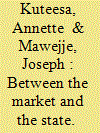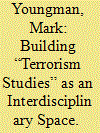| Srl | Item |
| 1 |
ID:
148948


|
|
|
|
|
| Summary/Abstract |
This study assesses the capabilities of business associations for conducting meaningful policy engagements with government. Using information from 21 associations and five state institutions, this work investigates the level of autonomy and ability of business associations to coordinate and order their interests for policy decision-making. Findings reveal that the ability to organise an association's own interests is hindered by weak systems and internal structures, especially at sub-sector level. Most associations are financially weak, have limited professional expertise and experience a low level of commitment from members, which affects their capacity for autonomy. It is important that business associations create regulations to make membership ties binding, so as to strengthen their influence on policy. Associations should also be more aggressive in mobilising finances, and they should identify synergies and develop partnerships with the state to build their capacity for participating in policy-making.
|
|
|
|
|
|
|
|
|
|
|
|
|
|
|
|
| 2 |
ID:
175713


|
|
|
|
|
| Summary/Abstract |
Over the years, there have been many debates regarding the state of research into terrorism and whether “terrorism studies” constitutes an academic discipline in its own right. Such reflections, coupled with the natural evolution of what is still a relatively new area of research, have arguably led to significant improvements in quality and rigour. At the same time, the status of terrorism studies itself remains somewhat ambiguous: it is both discussed as a distinct field and simultaneously evades criticism by pointing to the difficulties of defining its boundaries. There are undoubtedly a number of advantages to forming a separate discipline, which would go some way to helping the field address some of the recurring problems that terrorism research faces. However, this article ultimately argues that scholars are better served by deliberately moving in the other direction and developing the field as a space for interdisciplinary engagement.
|
|
|
|
|
|
|
|
|
|
|
|
|
|
|
|